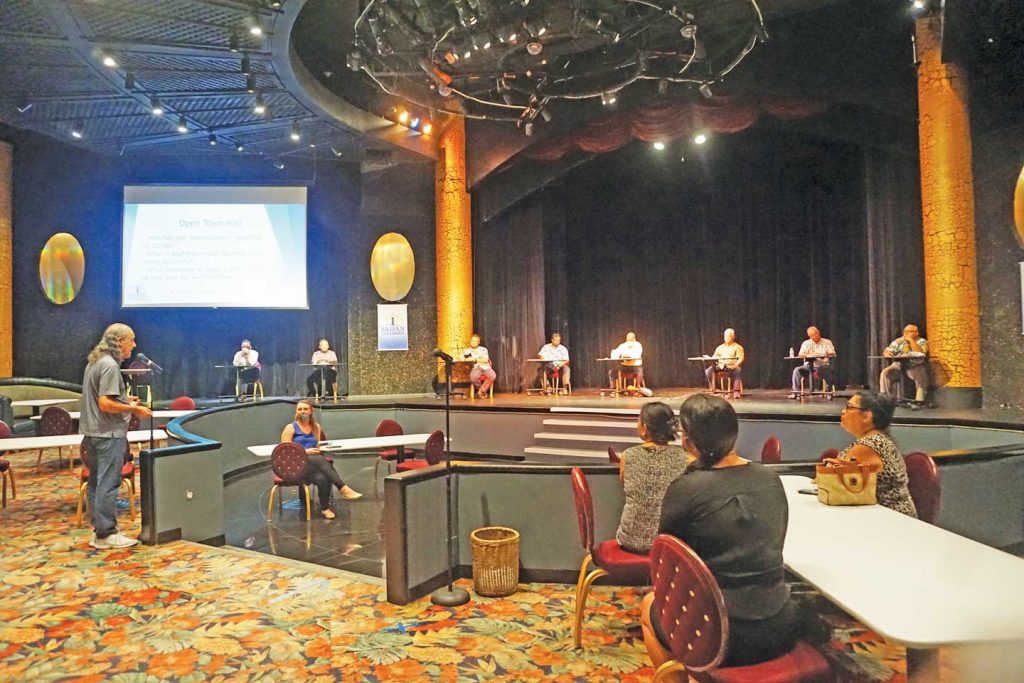AMIDST THE COVID-19 PANDEMIC
Small business owners beset by concerns, fears
Salon owner Jackie Laguiman is stumped, whether she should keep her shop open or just shut down.
“I don’t know what to do. Should I give up or continue on? It has been really tough for salon owners because people are still scared to go out,” she said.
That sentiment just about sums up the many fears and concerns that many small business owners in the CNMI raised during yesterday’s “Small Business Open Town Hall Forum” hosted by the Saipan Chamber of Commerce at the Hyatt Regency Saipan ballroom in Garapan.
Several business owners took to the floor and shared recommendations and current hurdles and fears in trying to run a business during the COVID-19 pandemic. Majority of the concerns include more cutback on operations due to CW-1 “touchback” requirement, streamlining the government’s permit processes, and reducing permit fees that have recently gone up with no clear notice to business owners.
At the very least, some business owners simply want advice on how to do business during the COVID-19 pandemic.
Small businesses also said they want more federal support and funding in place and available and to see to it that existing federal funding is going to the correct and intended projects like the construction of roads, ports, and infrastructure.
They also want to encourage military personnel on Tinian to come to Saipan so they can spend money on the island. Initiating a campaign that bears positive messaging about the CNMI both within and outside, food security, encouraging and supporting business-to-business deals, and more regular meetings with small businesses to make sure they are always heard were also suggested.
Chamber board chair Velma Palacios echoed their sentiments and acknowledged that they need help with regards to the CNMI Prevailing Wage Survey that has expired and businesses need when petitioning a foreign worker.
“Many people are renewing their CW-1 right now and, since our PWS has expired, the U.S. Department of Labor is telling them to use the Guam rates or somewhere near the Guam rates…even on appeal,” she said.

The Saipan Chamber of Commerce held its first town hall meeting last Wednesday at the Hyatt Regency Saipan ballroom to give small businesses an opportunity to be heard about the challenges they are facing during the pandemic.
(BEA CABRERA)
A panel, headed by Lt. Gov. Arnold I. Palacios, was in unison in saying that the challenges and recommendations of the people are being heard. “We also want to facilitate communication to small- or medium-sized businesses that are not a member of the Chamber so that they can also give us their thoughts,” he said. “We are all in this together, not just the business sector but also the government. How are we going to help businesses flourish with this global disaster? How we look at it and do things will be totally different. …For every challenge, there are opportunities and maybe this is a time for us to look where we are coming short, be honest, and take up the challenge to improve our business community.”
Aside from Palacios, Chamber leaders, and local business owners, the forum was also attended by House Speaker B.J. Attao (R-Saipan), House Tourism Committee chair Rep. Joseph Lee Pan Guerrero (R-Saipan), Senate Fiscal Affairs Committee chair Sen. Jude Hofschneider (R-Tinian), Senate legislative secretary and Senate Committee on Judiciary Government Law and Federal Relations chair Sen. Sixto Igisomar (R-Saipan), Governor’s Council of Economic Advisers chair Jerry Tan, GCEA Tourism and Infrastructure Committee chair Alex Sablan, and GCEA Economic Diversification Committee chair Matt Deleon Guerrero.
Anti-litter laws
Micronesia Islands Nature Alliance executive director Roberta Guerrero also spoke during the forum and lobbied for stricter enforcement of the anti-littering laws.
“We have been picking up other people’s mess. …I ask for more teeth into our laws to get more enforcement, then we would be a much better island. …Funding for beautification is ideal that would go into island beautification while there are no tourists,” she said.
Connectivity
Education Commissioner Dr. Alfred Ada also shared at the event that the biggest challenge they’re facing with remote learning are teaching devices and internet access.
“We need the two big internet providers on island…to help with internet access to the homes of the disadvantaged in order for us to continue and sustain education in our community,” he said.
Ada also said that it is time to have programs on fishery and farming and embrace the farm-to-table concept for sustainability and humanitarian reasons.























